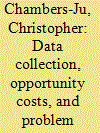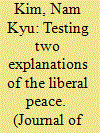| Srl | Item |
| 1 |
ID:
131682


|
|
|
| 2 |
ID:
107920


|
|
|
|
|
| Publication |
2011.
|
| Summary/Abstract |
Most aid spending by governments seeking to rebuild social and political order is based on an opportunity-cost theory of distracting potential recruits. The logic is that gainfully employed young men are less likely to participate in political violence, implying a positive correlation between unemployment and violence in locations with active insurgencies. The authors test that prediction in Afghanistan, Iraq, and the Philippines, using survey data on unemployment and two newly available measures of insurgency: (1) attacks against government and allied forces and (2) violence that kill civilians. Contrary to the opportunity-cost theory, the data emphatically reject a positive correlation between unemployment and attacks against government and allied forces (p < .05 percent). There is no significant relationship between unemployment and the rate of insurgent attacks that kill civilians. The authors identify several potential explanations, introducing the notion of insurgent precision to adjudicate between the possibilities that predation on one hand, and security measures and information costs on the other, account for the negative correlation between unemployment and violence in these three conflicts.
|
|
|
|
|
|
|
|
|
|
|
|
|
|
|
|
| 3 |
ID:
100946


|
|
|
|
|
| Publication |
2010.
|
| Summary/Abstract |
If trade affects the costs of conflict, does it also influence the likelihood of mediation attempts? This article argues that dense bilateral trade between antagonists yields high opportunity costs since it is expensive to seek alternative markets and the belligerents will be highly vulnerable to sanctions from their counterpart. This creates incentives for combatants to limit hostility and settle conflicts through mediation. By contrast, the extent to which belligerents trade with other states decreases the likelihood of mediation since antagonists with alternative partners can mitigate the consequences of sanctions and substitute for markets, which may be at risk or even lost because of the outbreak of a dispute. The divergent effects of different trade ties imply that the impact of bilateral trade on the prospects for mediation should vary conditional on countries' trade with states outside the dyad and vice versa. This article demonstrates that this is partially valid.
|
|
|
|
|
|
|
|
|
|
|
|
|
|
|
|
| 4 |
ID:
101859


|
|
|
|
|
| Publication |
2011.
|
| Summary/Abstract |
Poverty is often identified as a determinant of terrorist group participation, but existing research reveals mixed support for this relationship. Some studies find that macroeconomic decline is associated with increased production of terrorists, but micro-level research suggests terrorists have above average socioeconomic status and educational attainment. In this article, the author argues that poverty should increase terrorist group participation only for individuals with high education. The author suggests that as a result of terrorist group selection preferences and the lower opportunity costs for militant group membership in economically depressed environments, the likelihood of terrorist group participation should be highest for the highly educated, poor members of any population. The author tests the hypotheses using data from Krueger and Maleckova (2003) on participation in Hezbollah, adding an interaction term to their model. The results support the hypotheses. Poverty increases the likelihood of participation in Hezbollah only for those with at least high school education.
|
|
|
|
|
|
|
|
|
|
|
|
|
|
|
|
| 5 |
ID:
133717


|
|
|
|
|
| Publication |
2014.
|
| Summary/Abstract |
Considerable evidence suggests that economic interdependence and integration reduce the likelihood of militarized conflict. However, scholars have devoted remarkably scant attention to testing different explanations of the liberal peace. This article offers an empirical test that can help adjudicate the two main arguments on the liberal peace: the opportunity cost and signaling arguments. Under the incomplete information assumption, I derive different observable implications of the competing arguments regarding how target states respond when challenged. By estimating selection models comprising dispute initiation and reciprocation, I find that, as challengers are more dependent on bilateral trade, targets are less likely to reciprocate disputes, which is supportive of the signaling argument. Regarding dispute initiation, increases in foreign direct investment and financial openness are associated with a decrease in the probability of conflict initiation. Last, the pacifying effects of the liberal economic variables are much more pronounced in contiguous and major dyads than in other dyads.
|
|
|
|
|
|
|
|
|
|
|
|
|
|
|
|